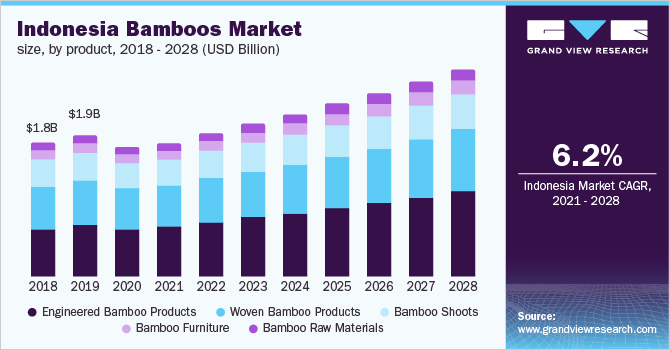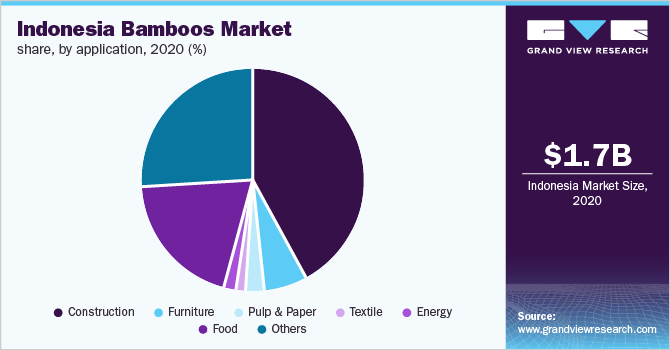- Home
- »
- Green Building Materials
- »
-
Indonesia Bamboos Market Size Report, 2021-2028GVR Report cover
![Indonesia Bamboos Market Size, Share & Trends Report]()
Indonesia Bamboos Market (2021 - 2028) Size, Share & Trends Analysis Report By Product, By Application (Construction, Furniture, Textile, Food, Energy, Pulp & Paper), And Segment Forecasts
- Report ID: GVR-4-68039-819-7
- Number of Report Pages: 63
- Format: PDF
- Historical Range: 2017 - 2019
- Forecast Period: 2021 - 2028
- Industry: Advanced Materials
- Report Summary
- Table of Contents
- Segmentation
- Methodology
- Download FREE Sample
-
Download Sample Report
Report Overview
The Indonesia bamboos market size was estimated at USD 1.7 billion in 2020 and is expected to expand at a compounded annual growth rate (CAGR) of 6.2% from 2021 to 2028. Rising demand for the product in several industries including construction, pulp & paper, furniture, and food is expected to drive the market over the forecast period. An increase in product usage in the construction industry for making walls, flooring, roofs, scaffoldings, doors, and windows due to high sustainability, less weight, high compressive strength, and natural appeal is expected to have a positive impact on the market growth. Bamboo is used as a construction material, due to its economical and eco-friendly nature, renewability, durability, and safety.

Indonesia possesses rich bamboo resources, and thus, it is widely grown in the country. Rising awareness regarding forest conservation and sustainable economic development are the major growth drivers for the market. Furthermore, growing concerns toward depleting forest resources and ecological imbalance are leading to the adoption of eco-friendly non-wood fibers.
The growth in demand for bamboo is expected to be restrained by high maintenance and preservation costs associated with the material. Bamboo has durability issues and is comparatively more fragile than other materials such as steel and concrete. Bamboos used in handicraft and construction applications need to be preserved under controlled conditions to avoid the buildup of bacteria, thus limiting their utilization.
The global outbreak of the COVID-19 pandemic in 2020, led to a major decrease in the growth of the bamboos market, led to major disruptions in the supply chain of bamboo products, due to transportation restrictions imposed by the government to avoid the virus transmission. In addition, temporary closure operations of end-use industries such as constructions, furniture, and textiles, led to a decrease in bamboo sales.
The decreasing case numbers in 2021, and government initiatives for handicraft industry upliftment and opening of construction operations under strict COVID norms, is expected to normalize market growth over the coming years.
Product Insights
The engineered bamboos led the market and accounted for the largest revenue share of more than 37.0% in 2020. Shifting interest toward cost-effective, sustainable, and environment-friendly construction materials is driving the development of bamboo products. Engineered bamboo products have several uses in paneling, lightweight building construction, and concrete formworks.
Bamboo is also widely known as an eco-friendly material to replace wood that is used to make furniture. Its mechanical resistance, and easy availability in tropical and subtropical regions of Indonesia, and its ease of processing have led to the use of bamboo as a base material for furniture production.
Woven bamboo products are estimated to register a significant CAGR of 5.4% over the forecast period, owing to their rapidly growing usage for making cases, trays, jars, statues, handbags, and mats. The rapidly growing rural handicraft industry in the country is expected to create new growth opportunities in the woven bamboo products market.
The other major product types include bamboo raw materials and bamboo shoots. The shifting trend toward substituting wood with an inexpensive alternative that also possesses similar physical and mechanical properties compatible with wood is driving the demand for bamboo as a raw material.
Application Insights
The construction segment led the Indonesia bamboos market and accounted for the largest revenue share of more than 42.0% in 2020. This is attributed to the growing inclination by government and construction companies toward reducing carbon dioxide emissions from the construction industry. Zero-waste production, minimum pollution, and fast-growing capability are driving the demand for bamboos in Indonesia’s construction industry.
The product is expected to have burgeoning demand in furniture owing to the growing focus of furniture industry players towards introducing new trends in production by incorporating green technology and minimizing ecological damage. In addition, furniture designers are focusing on constructing bamboo-based aesthetically mesmeric home furniture, thus creating new growth opportunities in the bamboo market.

The demand for bamboos in the Indonesian energy sector is expected to witness a CAGR of 8.7% from 2021 to 2028, owing to growing consumer focus towards the utilization of bamboo as raw material for energy production, to reduce greenhouse emissions. Bamboo has many characteristics such as volatile contents, lower ash, and less moisture content, making it suitable for bioenergy production.
The other major application industries for bamboos include food, textile, and pulp & paper. Increasing demand for pulp & paper products with non-wood resources to boost civilization and economic development is expected to drive bamboos market growth. In addition, shifting focus to green alternatives by textile manufacturers in place of synthetic fibers is expected to benefit bamboos market growth.
Key Companies & Market Share Insights
The market is expected to witness highly competitive rivalry, owing to the intense competition between the domestic as well as international players. Various market players follow a focused cost leadership strategy, where they attempt to provide the products to their customers at a lower price than their competitors.
The market exhibits fragmented nature owing to the presence of small players, coupled with huge potential growth opportunities. The market is characterized by a considerable consumer base, with the companies operating their business through dedicated distribution networks. Some of the prominent players in the Indonesia bamboos market include:
-
PT Bamboo Craft Indonesia
-
EcoPlanet Bamboo Group
-
Dasso Industrial Group Co., Ltd.
-
MOSO International B.V.
-
Asali Bali
-
SahabatBambu
-
Bamboo Mamboo Co., Ltd.
-
PT. Dekor Asia Jayakarya
-
IBUKU
-
Gumi Bamboo
Indonesia Bamboos Market Report Scope
Report Attribute
Details
Market size value in 2021
USD 1.8 billion
Revenue forecast in 2028
USD 2.8 billion
Growth Rate
CAGR of 6.2% from 2021 to 2028
Base year for estimation
2020
Historical data
2017 - 2019
Forecast period
2021 - 2028
Quantitative units
Revenue in USD million and CAGR from 2021 to 2028
Report coverage
Revenue forecast, company ranking, competitive landscape, growth factors, and trends
Segments covered
Product, application
Country scope
Indonesia
Key companies profiled
PT Bamboo Craft Indonesia; EcoPlanet Bamboo Group; Dasso Industrial Group Co., Ltd.; MOSO International B.V.; Asali Bali; SahabatBambu; Bamboo Mamboo Co., Ltd.; PT. Dekor Asia Jayakarya; IBUKU; Gumi Bamboo
Customization scope
Free report customization (equivalent up to 8 analyst’s working days) with purchase. Addition or alteration to country, regional and segment scope.
Pricing and purchase options
Avail customized purchase options to meet your exact research needs. Explore purchase options
Segments Covered in the ReportThis report forecasts revenue growth at country levels and provides an analysis of the latest industry trends in each of the sub-segments from 2017 to 2028. For the purpose of this study, Grand View Research has segmented the Indonesia bamboos market report on the basis of product and application:
-
Product Outlook (Revenue, USD Million, 2017 - 2028)
-
Bamboo Raw Materials
-
Bamboo Shoots
-
Woven Bamboo Products
-
Engineered Bamboo Products
-
Bamboo Furniture
-
-
Application Outlook (Revenue, USD Million, 2017 - 2028)
-
Construction
-
Furniture
-
Pulp & Paper
-
Textile
-
Energy
-
Food
-
Others
-
Frequently Asked Questions About This Report
b. The Indonesia bamboos market size was estimated at USD 1.7 billion in 2020 and is expected to reach USD 1.8 billion in 2021.
b. The Indonesia bamboos market is expected to grow at a compound annual growth rate of 6.2% from 2021 to 2028 to reach USD 2.8 billion by 2028.
b. Construction led the market and accounted for more than 42.03% share in 2020. This is attributed to the growing inclination by government and construction companies toward reducing carbon dioxide emissions from the construction industry.
b. Some of the key players operating in the Indonesia bamboos market include PT Bamboo Craft Indonesia, EcoPlanet Bamboo Group, Dasso Industrial Group Co., Ltd., MOSO International B.V., Asali Bali, Sahabat Bambu, Bamboo Mamboo Co., Ltd., and others.
b. The key factors that are driving the Indonesia bamboos market include growing product demand from several application industries including construction, furniture, pulp & paper, energy, textile, and food, towards the replacement of synthetic materials with natural products.
Share this report with your colleague or friend.
Need a Tailored Report?
Customize this report to your needs — add regions, segments, or data points, with 20% free customization.

ISO 9001:2015 & 27001:2022 Certified
We are GDPR and CCPA compliant! Your transaction & personal information is safe and secure. For more details, please read our privacy policy.
Trusted market insights - try a free sample
See how our reports are structured and why industry leaders rely on Grand View Research. Get a free sample or ask us to tailor this report to your needs.










